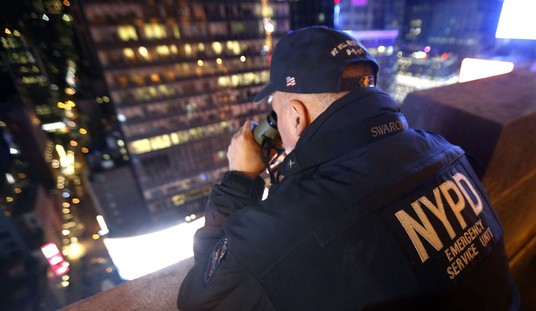Readers who detect a disturbing echo from the past in the next several paragraphs aren’t imagining things.
On February 23, a California-based company which owns a window manufacturing plant in Chicago announced that it would close the facility because of poor business conditions, specifically citing “ongoing economic challenges in construction and building products, collapse in demand for window products, difficulty in obtaining favorable lease terms, high leasing and utility costs and taxes, and a range of other factors.”
The very next day, the company, Serious Energy, Inc., went all Orwell:
Members of the press received incomplete and incorrect information that Serious Energy would be closing the facility immediately. The Chicago plant remains open at this time, and the parties are working together to find a new owner if possible and explore all other options. Both UE and Serious Energy apologize for any resulting confusion.
“UE” is United Electrical Workers Union Local 1110. Serious Energy made no mention of what drove the change which it said wasn’t a change but really was, namely that shortly after its original announcement, “about 65 people, mostly employees, locked themselves inside the 268,000-square-foot facility.” In other words, the union and its workers re-occupied the plant.
That’s right, they “re-occupied” it. The plant’s original occupation, in many respects the precursor of the lawless Occupy movement which “somehow” appeared in September of last year, came in December 2008. That’s when its then-owner, Republic Windows and Doors, having lost $10 million in the past two years, told employees that it would close the plant in three days. Workers “occupied the building,” and said they wouldn’t leave “without assurances they’ll receive severance and vacation pay.”
Bank of America, which had cut off the company’s credit line because of its deteriorating financial condition, was unfortunately but understandably intimidated by the assemblage of politicians, activists, and leftist rabble which had gravitated to what they thought might be the start of a movement. As a result, six days later, it made “an additional loan” (the bank’s words) of $1.35 million to make the problem go away. For some reason, J.P. Morgan Chase also “pledged” $400,000.
The Associated Press’s headline called this result “successful.” In reality, it may be the most costly $1.75 million shakedown ever conducted — if not for the workers, certainly for their nation.
Here’s a synopsis of the plant’s subsequent history:
- In mid-December 2008, Republic filed for bankruptcy.
- Serious Energy bought the plant in February 2009.
- In a March 2009 press release followed by an April visit, Vice President Joe Biden declared that the administration’s stimulus plan would “increase demand for its products.”
- The $5 billion “weatherization” element of the stimulus plan which was supposedly going to keep the plant and other window makers going was “initially delayed for seven months while the federal Department of Labor determined prevailing wage standards for the industry.” Since then, like Solyndra and so many of Team Obama’s other “green energy” efforts, it has been an epic fail, accurately characterized as a “a complete cesspool of waste” by the conservative fiscal watchdog group Citizens Against Government Waste.
- Despite the glowing promises, the union now says the company “never hired back more than 75” of the plant’s workers.
- Serious hasn’t promised to keep the Chicago facility open, but has instead said it will spend 90 days from the date of its announcement trying to find a buyer — and presumably installing really strong locks on its doors and gates.
That’s not all. On February 22, the day before Serious’s original closing announcement, the Federal Trade Commission trumpeted consent agreements it had obtained from five window manufacturers relating to their claims that consumers could cut their home energy bills by 40% to 50% with replacement windows alone (it’s really more like 7% to 15%, according to Consumer Reports). One of the five? You guessed it. It seems quite likely that these companies’ exaggerated claims were used as a basis for estimating how much energy savings the government’s weatherization program would achieve. “Seriously,” you can’t make this stuff up.
The harm done to the nation’s economy by the original Republic occupation was far more serious, and is still with us.
You see, one of those who took the workers’ side in 2008 was President-elect Barack Obama — a point which has gone virtually unmentioned in recent media coverage of the plant’s impending demise. On December 8, Obama pointedly lent his support to the workers’ cause while failing to call out their lawless behavior:
“The workers who are asking for the benefits and payments that they have earned, I think they’re absolutely right and understand that what’s happening to them is reflective of what’s happening across this economy,” Obama said.
Two days later, the banks caved.
Yours truly immediately recognized the much larger problem with what Obama had done:
It won’t take very much of this before businesses conclude that putting employees on the payroll must be avoided as long as possible, if it’s to be done at all. They will more frequently use temporary agency employees as long as they legally can. They won’t replace employees who retire or leave. They’ll have more work done in other countries. They won’t pursue business ideas that require U.S. employees. The trend toward professional employment organizations (PEOs, or “leased employees”) will accelerate.
More such appearances by Obama as rabble-rousing community organizer in chief will go a long way towards ensuring that his “get worse before it gets better” prediction about the economy becomes tragically true.
In hindsight, I believe that Obama’s unprecedented reaction to what had been a private business dispute marred by union and worker lawlessness played a critical and immediate role in deepening and extending the recession, and that it continues to hold back the alleged recovery.
Keep in mind that he, along with Nancy Pelosi and Harry Reid, had already spent the previous six months going back to the beginning of what I have been calling the POR (Pelosi-Obama-Reid) economy since mid-2008 frightening investors, businesspeople, and entrepreneurs with what they said they would do if they achieved power. Those promises were radical: government control of health care, massive income and Social Security tax increases, and cap-and-trade, to name just a few. Employment, which had been declining, began to completely tank.
Obama’s first thirty days as president-elect, though overbearing in many ways, gave some people hope that his Democratic administration, like Bill Clinton’s, might not be as radical as first feared. Obama announced that he would defer originally planned tax increases. His early economic appointments, though insufferably Keynesian, were at least not off-the-chart socialists. What’s more, it was plausible to believe that the economy, thanks to low interest rates and a return of gas prices to under $1.70 per gallon from over $4 five months earlier, might be righting itself, or at least that the worst of the bleeding might almost be over.
Obama’s statement about the Republic situation completely dashed those hopes. What’s more, his community organizer in chief pronouncement came just in time for January, which is always the worst month of the year for layoffs and terminations. An astounding 3.25 million private-sector workers lost their jobs in January 2009, the largest raw number of job losses in the seventy-plus years monthly records have been kept — by over 700,000. January 2009 was also the worst month on record after seasonal adjustment. The mid-February 2009 passage of the stimulus plan and the Obama-condoned AIG executive intimidation campaign only confirmed what everyone in business pretty much already knew, namely that this would become the most aggressively commerce-hostile administration since Franklin Delano Roosevelt — well on its way, especially after considering its mob-rule acolytes, to becoming the worst in U.S. history. Subsequent actions far too numerous to mention here have cast that evaluation in concrete. The worst post-downturn economic performance since the Great Depression is their tragic result.
My response to the administration’s tired propaganda claim that the national economic situation was sooooo much worse than they thought when they first took office is as follows: Even if that’s true, it’s because your guy made it that way.









Join the conversation as a VIP Member